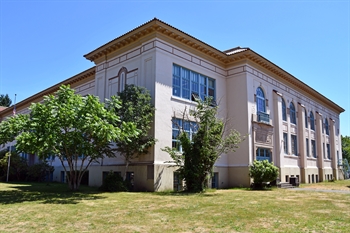SCHOOL
Progressive Changes at Lincoln Elementary
Influenced the Community
By Steven Kant

In the early 1970s, my first job in education was in a special education classroom at Lincoln Elementary School in Olympia. At the time, Lincoln was a traditional school with a somewhat conservative principal. I was twenty-one years old, and the school district personnel officer warned me that I might not get hired at Lincoln because I had a beard and long hair. I did get the job and worked there for about six months until the end of the school year.
In those days, special education students were usually placed in separate classrooms. Since the rural districts in Thurston County did not have their own special education programs, students in those districts were taken on a long bus ride to classrooms in Olympia every day where they emerged tired, angry, and sometimes already punching each other.
The school building was quite different in those days. There was an auditorium that is now the library, and there was no gym and no covered play area. All of the staff dreaded rainy days when we herded the students into a World War II vintage quonset hut (since demolished), threw in a large number of rubber balls, and observed the result—the students flung the balls at each other until we heard crying and had to intervene.
One day after I was done with my job, I followed the sounds of fun upstairs and found a class engaged in answering questions in teams in a quiz-show format, complete with buzzers and lights. This turned out to be the classroom of Randy Edwards. I was soon going there regularly to play guitar and lead sing-alongs. Randy was a few years older than me and had been teaching for about five years.
In those days, an older man in his sixties named Art Zabel would often visit the school. He would cruise around, greeting students and handing out candy. Art also went with us to swim at Tumwater Valley where he helped us out with the kids. The Zabel family had built and owned the Capitol Theater downtown and they also created a large rhododendron garden that was opened to the public each year and is now a public park.
In 1984, alternative-thinking parents worked with the school district to create an elementary options program, and in 1995, the program was moved to Lincoln School and renamed Lincoln Options. The alternative programs were expanded in later years to another elementary school and two middle schools. The influence of these programs was also felt in many other schools.
Twenty years later, when I had children of my own, I returned with a parent band from the Olympia Community School to play an engagement at Lincoln and was happy to reconnect with a delighted “Mr. E” who had remained at the school. My daughter Lindsay went to kindergarten at OCS. Her teacher was Marcela Abadi, who later taught at Lincoln. I knew several teachers at Lincoln as friends. Art Zabel was still around in his eighties, helping kids with reading and still giving out candy,
In more recent years, I have volunteered at Lincoln and brought my grown children as well. I once visited a fourth-grade class to do algebra. I had brought along Lindsay and her college friend Tamasha. Marcela explained to her class that these two college students had been in her kindergarten class and had done the same algebra there. My stepdaughter Hillary—a former Lincoln student—is also a frequent Lincoln volunteer.
The progressive community that created Lincoln and OCS has had a big influence on my family and on all of us. The teacher of one of the classes I visited is a former Lincoln student. Tamasha became a teacher in Seattle. Lindsay is finishing a master’s degree in education and plans to work as a teacher in New York. Hillary has worked in Shelton schools and is a substitute teacher in Olympia. Lincoln has been a gathering place for students and parents who have been involved in many types of social and political activism.
Most of the friends I knew who taught at Lincoln and other schools have now retired. Marcela has been the principal of the school for many years. Randy Edwards retired in 2004. He died in 2022. Art Zabel died in 2008.
In recent years, the older man in his sixties who wanders into the school is me—still playing guitar, but teaching algebra, bringing math toys, and giving out origami math figures instead of candy.
We encourage readers to contact us with comments and corrections. Disclaimer

Steven — I fell down this sites rabbit hole by accident and loved your stories of Lincoln and your early engagement. Very cool!